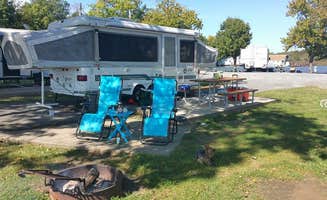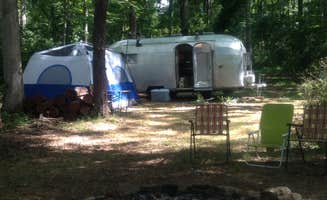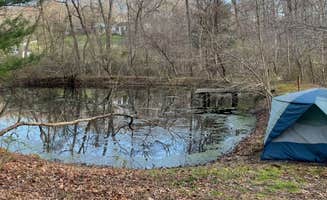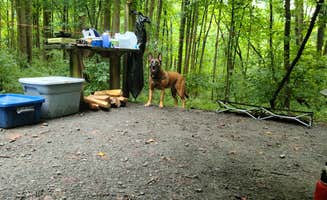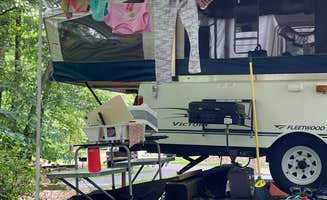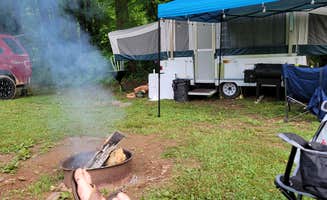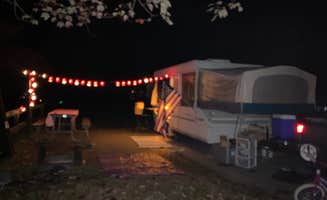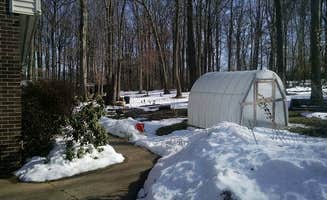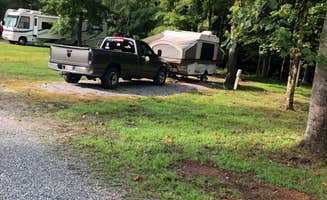Camping options near Forest Hill, Maryland span across northeastern Maryland and into southern Pennsylvania, with most locations situated within a 30-mile radius. The area's topography features rolling hills with elevations ranging from 300-600 feet above sea level, creating varied camping experiences from riverside locations to more elevated woodland settings. Winter temperatures typically drop to the 20s-30s at night, making most campgrounds seasonal operations with limited or no winter availability.
What to do
Kayaking and water access: At Bar Harbor RV Park & Marina, water recreation is just steps from your campsite. "Camped here at the end of summer, really loved it. Had our kayaks with us and the water wasn't but a few steps away. Some sites you are right on the waters edge," notes Janet P. The park offers boat docks and fishing opportunities directly from waterfront sites.
Hiking near water features: Explore the trails around Pequea Creek Campground where the landscape offers creek and river views. "We enjoyed the birds singing in the mornings and welcomed grandkids' visit for splashing and floating in Pequea Creek," shares J W. The campground provides direct access to the 14-mile Enola Low Grade Trail which runs along portions of the Susquehanna River.
Wildlife viewing: The Forest Hill region offers excellent wildlife spotting opportunities, especially birds. According to Thomas K. at Susquehanna State Park, this location "primarily draws Eagle watchers and photographers." Many campgrounds have designated nature trails or wildlife viewing areas where guests can observe local fauna in their natural habitat.
What campers like
Secluded, wooded sites: Many campers praise the privacy found at Otter Creek Campground, which offers spacious sites with natural buffers. "Great family campground with plenty to do," notes George. Sean M. adds, "From the spacious sites, respectful staff and friendly seasonal campers we felt like we didn't have a care in the world."
Swimming and splash features: For families seeking water activities beyond the river, Yogi Bear's Jellystone Park receives high marks for its water amenities. Aaron E. reports, "The water park was GREAT for kids and adults. Super clean. Lots to do. Well worth a week." This offers an alternative to natural swimming spots, which can be limited in the region.
Clean facilities: Campers frequently mention the quality of restrooms at Codorus State Park Campground. "Paved sites, modern, clean bathrooms," notes Mike C., while another camper adds, "Campground bath houses were very clean, nice hot showers with great showerhead that stayed on without pushing a button." This attention to cleanliness stands out as a consistent positive feature.
What you should know
Seasonal limitations: Most campgrounds in the region close completely or reduce services during winter months. Kevin M. at Codorus State Park notes, "No water but the bath house was close and very clean," which is common at parks that winterize their water systems. Operating seasons typically run from April through October.
Site selection matters: At many campgrounds, there's significant variation between sites. At Muddy Run Rec Park, Chris G. warns, "Sites in the 20's are tiny and hanging off a cliff," while another camper mentions, "We lucked out with a lot that was slightly more secluded on the end of a road, but paid for it with a very sloped lot." Researching specific site reviews before booking can prevent disappointment.
Water hookup challenges: Multiple campers mention the need for extra-long water hoses. "Bring 50 ft of hose for water hook up and an extension cord with a converter. The water hook ups are randomly placed, ours was 2 sites away," advises Chris G. at Muddy Run Rec Park. This infrastructure issue appears common at several campgrounds in the region.
Tips for camping with families
Choose activity-rich campgrounds: Families with young children often prefer places with structured activities. A camper at Tucquan Park Family Campground notes, "There were a lot of events for everyone of all ages. The sites were a little close together but still plenty of room. The pool and playground were very clean and well taken care of."
Consider age-appropriate options: Different campgrounds cater to different age groups. At Yogi Bear's Jellystone Park, one camper advises, "We returned this year with my 12 and 14 year olds and a 12 year old friend. The kids were bored." This suggests the facilities there may better serve younger children rather than teens.
Look for playgrounds and pools: Campgrounds with good recreational amenities receive higher family ratings. At Merry Meadows Recreation Farm, Amy R. shares, "Such a wonderful campground. We have visited 5x this year. Wooded sites, open sites, tent sites. All great!" The park features miniature golf, a jump zone, and a playground, making it popular for repeat family visits.
Tips from RVers
Site access considerations: RVers should research approach roads and site angles. At Bar Harbor RV Park & Marina, Laure D. notes, "You have to drive through a residential neighborhood to reach Bar Harbor, so big rigs take care/caution." Some sites present backing challenges, as George L. explains: "Some of the trailer sites are a tough back in but worth the trouble."
Hookup placement: Electric and water hookup locations vary significantly between campgrounds and even sites. At Bar Harbor, one reviewer observed their "Water hookup access was on the ground. It was raining and the area was saturated with no where to drain." Plan for extension cords and extra-long water hoses when preparing for a trip to this region.
RV size restrictions: While many campgrounds advertise as big-rig friendly, site dimensions can be misleading. At Elk Neck State Park, a camper advises, "In the full hook up loop pay close attention to the lengths specified. The actual pads are fairly level but some of the driveways to them are very sloped. Long rigs will have issues in a few of the sites." This type of specific information is crucial for larger RVs.


